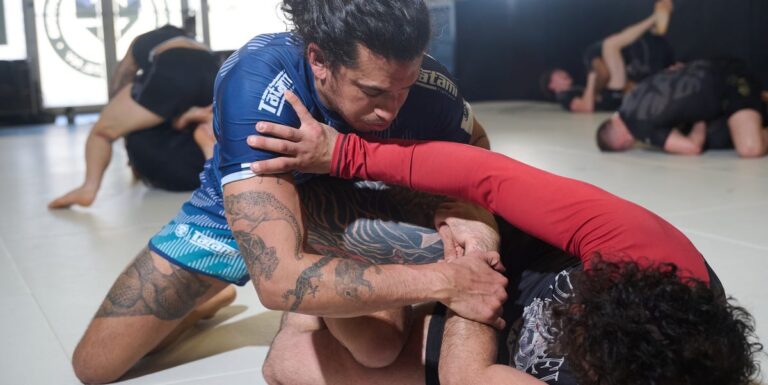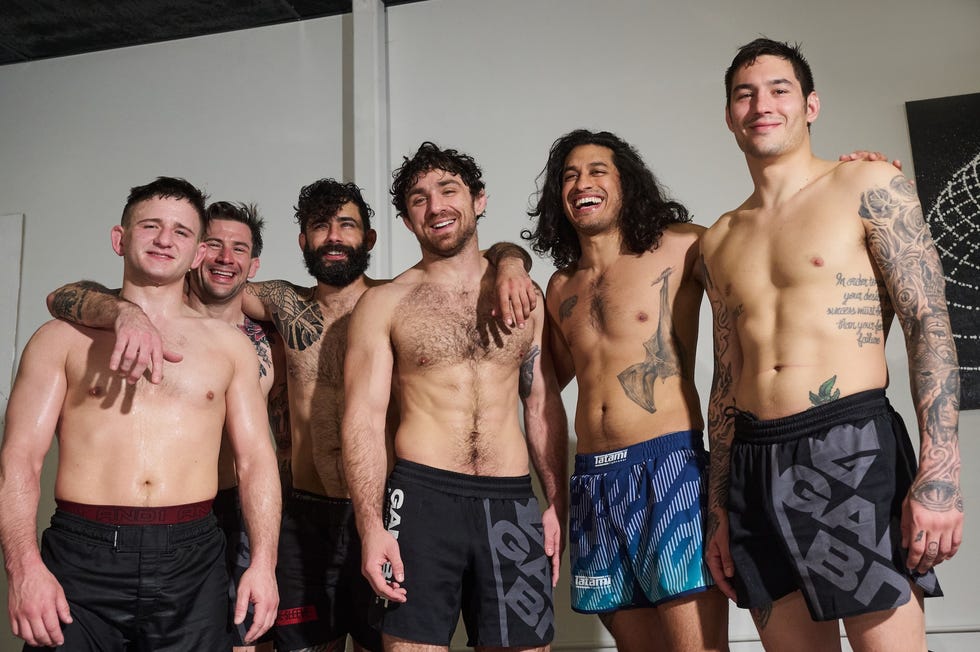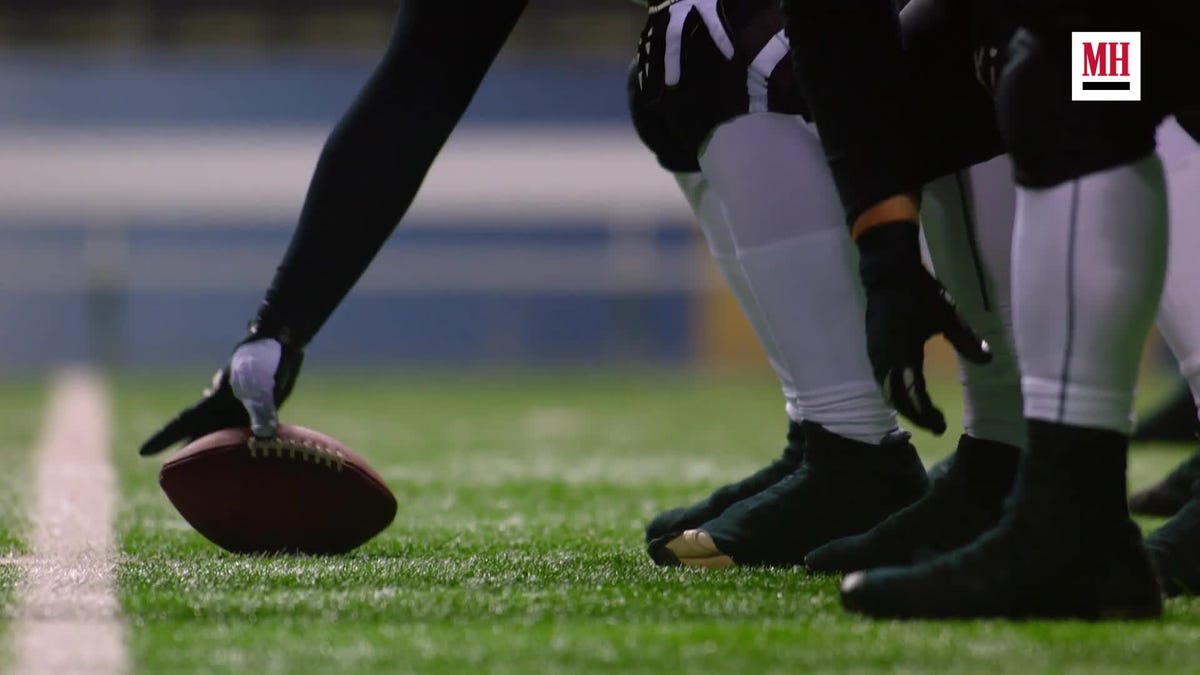COMBAT DOESN’T COME naturally to me.
I grew up practicing Jainism, an ancient faith that instructs followers to avoid killing living things, even gnats and cockroaches. I’m also not much of an athlete. Then, there’s the fluids. As a doctor who spent nearly a decade investigating infectious disease outbreaks around the world, I really should know better than to roll around on a vinyl mat covered in sweat, saliva, and— sometimes—blood.
Nevertheless, I fell hard for Brazilian jiu jitsu.
The sport, which features light throws, chokeholds, and potentially bone-breaking submissions, has recently drawn a great deal of attention. Some of its highest-profile practitioners are ardent supporters of President Trump, and jiu jitsu is huge among “manosphere” icons like Joe Rogan. Earlier this year, Mark Zuckerberg ignited a media firestorm when he told Rogan that his jiu jitsu training helped him realize society is “neutered” and that the corporate world needs more “aggression.” Thanks to this current spate of mainstream attention, many people assume that martial arts studios are dens of toxic masculinity, ruled by reactionaries, raw-meat evangelists, and knuckle-draggers. Some gyms might be closer to that than others—but, in my experience, that couldn’t be further from the truth.
In an era of hyperpartisanship and alienation, I’ve seen firsthand how jiu jitsu can be a moderating force. The gyms I’ve trained at have made me—and many of my fellow practitioners—better neighbors, reminding us how to co-exist despite our many differences. They are social spaces ruled by cooperation and trust. Our country needs more environments like that.
I came to jiu jitsu by accident at 36 years old, following an employer-mandated active-shooter training. For four years, I trained in New York City, grappling with bartenders and baristas, lawyers and software engineers, filmmakers and Wall Street executives. We shared similar politics and ran in similar circles. Then last year, I moved upstate, to a hamlet of 600 people, and it transformed my appreciation for the sport—and its practitioners.
My rural cohort is different. There are more construction workers and teachers, waiters and cops. Almost everyone is white, and many are conservative, own firearms, and are passionate hunters. Then there’s me: the vegetarian Indian-American physician-epidemiologist who has never shot a gun. When I first walked into that gym, tucked away in a strip mall, I felt like an interloper. I wasn’t sure how to interact with the others, and I never expected that we’d become good friends. But there’s no quicker way to zip through the get-to-know-you phase than trying to strangle each other.
In a gym, every jiu jitsu match is an act of blind faith. It forces you to trust, and assume that the person across from you has your interests in mind and will keep your bones intact. The rules of submission dictate that as soon as your opponent taps, or appears to be in danger, the fight is over. You remove your knee from their belly. You help them to their feet. You acknowledge each other’s skills, sometimes discussing areas for improvement. There’s a code of reciprocity: a tacit agreement to set aside lone-wolf tendencies and embrace collective welfare, because it’s the only way anyone will grow as a fighter.
Jiu jitsu shatters the ego. The very first lesson that any novice learns is that “the mats don’t lie.” There is no place for bravado or gloating. Poseurs will be punished, perhaps by someone fifty pounds lighter. Hardheadedness will get you nowhere. Jiu jitsu exists in constant flux, and experienced players will open themselves up to new strategies as a match unfolds, while letting go of others once their moment has passed. They listen to their peers and pressure-test their long-standing assumptions. I know black belts with fifteen years of experience who still attend the fundamentals class alongside newbies.
I try to bring those lessons—in humility, in curiosity—into my everyday existence, but I’m still learning. Recently, during a group gripe about the state of U.S. healthcare, a teammate donned a hat emblazoned with “Make America Healthy Again” across the front. “This is what we really need,” he said earnestly. I could have embraced the civic lessons of jiu jitsu: set aside ego and engage in constructive conflict. Instead, I launched into a breathless rant about the dangers of vaccine denialism within the Make America Healthy Again movement and how this threatens the lives of untold children in this country. I might be a public health expert, but at that moment I didn’t act like the black belts I know—patient, humble, and measured.
My teammates, on the other hand, continually show me how collective growth is possible when we respect each other in the same space where we strangle each other. Coaches at the gym hold fundraisers to support students during tough times, even when their circumstances couldn’t be more different. Skeptics of the COVID-19 vaccine have softened their views on these life-saving inventions after seeking my professional opinion. There are some head-scratching examples too. I train with a person who regularly posts white supremacist memes on social media. But he also hits “like” on photos of my interracial relationship and calls me “brother” when we grapple.
Unlike a relative’s house or the doctor’s office, the jiu jitsu gym is neutral territory. Given the right environment, it can exist outside entrenched social hierarchies that shape everyday interactions. These so-called “third spaces”—libraries, places of worship, parks—are the connective tissue of a community, though they’ve become rare in the modern world. They force us to mix, mingle, and embrace a wide variety of people; forge unlikely friendships; and open our minds to new perspectives.
Jiu jitsu brings me and my neighbors together, across backgrounds and politics, and our training teaches us how to disagree in a kinder, gentler, more tolerant way. We’ve built enough trust to challenge each other, and we do it all the time. We clash over horror movies and testosterone replacement therapy, as well as DEI efforts and immigration policy. We won’t always change each other’s mind. But jiu jitsu teaches us to let go of the “all or nothing” mentality that has come to dominate American politics—and, even in moments of intense conflict, view our opponents as reasonable, well-meaning people, all trying our best in a rapidly changing world.
I love the primal, heart-pounding rush of jiu jitsu. But it’s the feeling of community that keeps bringing me back to the mat—something that we all need to re-discover outside the gym.
Neil Vora is a practicing physician, a Senior Advisor at Conservation International, and the Executive Director of the Preventing Pandemics at the Source Coalition. He worked as a disease detective for the US Centers for Disease Control and Prevention (CDC) for nearly a decade (2012-2021). He is deeply grateful to his jiu jitsu coaches and training partners for their friendship and the many lessons he has learned from them.
Neil Vora, MD is a practicing physician, a Senior Advisor at Conservation International, and the Executive Director of the Preventing Pandemics at the Source Coalition. He worked as a disease detective for the US Centers for Disease Control and Prevention (CDC) for nearly a decade (2012-2021).
Read the full article here




